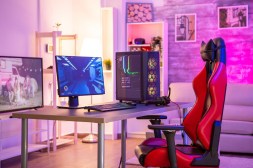The Ultimate Guide to Choosing the Right Components for Your Gaming PC
Whether you are a casual gamer or an avid enthusiast, building your own gaming PC can be an exciting and rewarding experience. However, with so many options available in the market, it can also be overwhelming to choose the right components for your gaming rig. From the processor to the graphics card, each component plays a crucial role in determining your gaming performance. In this guide, we will walk you through the essential components that you need to consider when building a gaming PC.
The Processor – The Heart of Your Gaming PC
The processor, also known as the CPU (Central Processing Unit), is often referred to as the heart of your gaming PC. It is responsible for performing all the calculations and executing instructions that drive your games. When choosing a processor for your gaming rig, there are two main factors to consider: performance and compatibility.

In terms of performance, you should look for a processor with high clock speeds and multiple cores. Clock speed refers to how fast the processor can perform calculations per second, while multiple cores allow for better multitasking and improved overall performance.
Compatibility is another crucial factor when selecting a processor. You need to ensure that it is compatible with your chosen motherboard socket type. Intel and AMD are two major players in the CPU market, each offering different socket types and generations of processors. Researching compatibility before making a purchase will save you from any potential headaches down the line.
Graphics Card – Bringing Your Games to Life
The graphics card, or GPU (Graphics Processing Unit), is responsible for rendering images and videos on your screen. It plays a vital role in delivering smooth gameplay and stunning visuals. When selecting a graphics card for your gaming PC, there are several factors to consider.
Firstly, you need to determine the level of performance you desire. High-end GPUs are capable of running games at higher resolutions with maximum settings, while mid-range GPUs offer a balance between price and performance. It’s essential to match your GPU’s capabilities with the monitor’s resolution and refresh rate you plan to use.
Secondly, consider the amount of VRAM (Video Random Access Memory) the graphics card has. VRAM is dedicated memory for storing textures and other graphical assets. More VRAM allows for smoother gameplay at higher resolutions and detail levels.
Lastly, check for compatibility with your motherboard and power supply unit (PSU). Ensure that your chosen graphics card physically fits in your case and that your PSU can provide enough power to support it.
Memory – Keeping Your Games Running Smoothly
Memory, also known as RAM (Random Access Memory), is crucial for ensuring smooth gameplay and multitasking capabilities. When it comes to gaming PCs, having sufficient RAM is essential. The amount of RAM you need largely depends on the games you play and other applications you run simultaneously.
For most gaming setups, 8GB of RAM is considered the minimum requirement. However, if you want to future-proof your system or play more demanding games, it’s recommended to opt for 16GB or even 32GB of RAM.
Additionally, pay attention to the speed and latency of the RAM modules. Higher speeds and lower latencies result in faster data transfer rates, which can improve overall system performance.
Storage – Ensuring Quick Load Times
Storage is often overlooked but plays a significant role in gaming performance. There are two primary types of storage devices used in gaming PCs: solid-state drives (SSDs) and hard disk drives (HDDs).
SSDs offer faster read/write speeds than HDDs, resulting in quicker game load times and improved system responsiveness. They are more expensive per gigabyte compared to HDDs but are well worth the investment for gamers looking for optimal performance.
HDDs, on the other hand, provide more storage capacity at a lower cost. They are a viable option for storing large game libraries or other media files.
In conclusion, building a gaming PC requires careful consideration of the components that will ultimately determine your gaming experience. By selecting the right processor, graphics card, memory, and storage for your needs, you can create a powerful and immersive gaming rig that will keep you entertained for years to come.
This text was generated using a large language model, and select text has been reviewed and moderated for purposes such as readability.


